Thomas James Richards, Diaries, Transcript Vol. 2 - Part 11
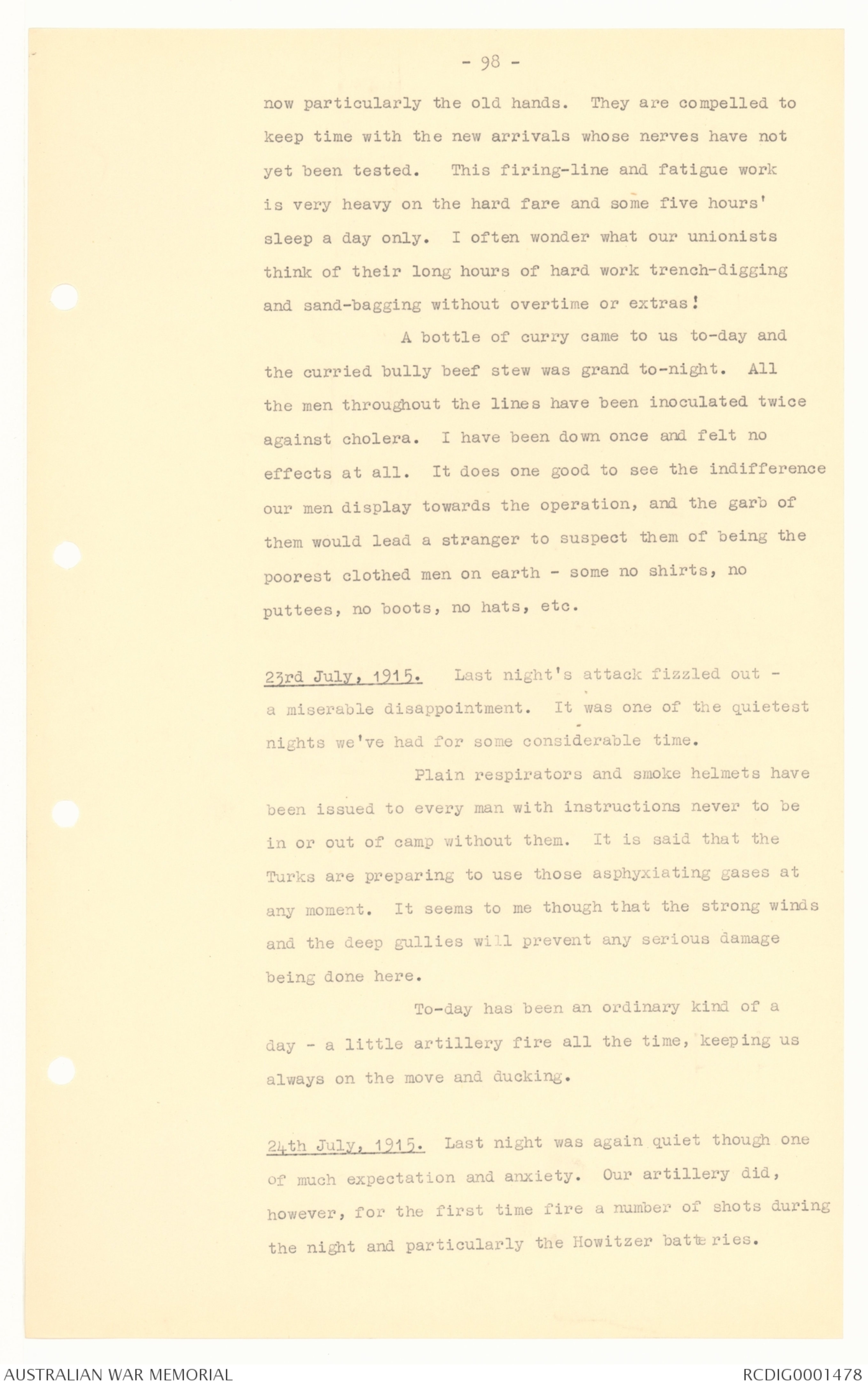
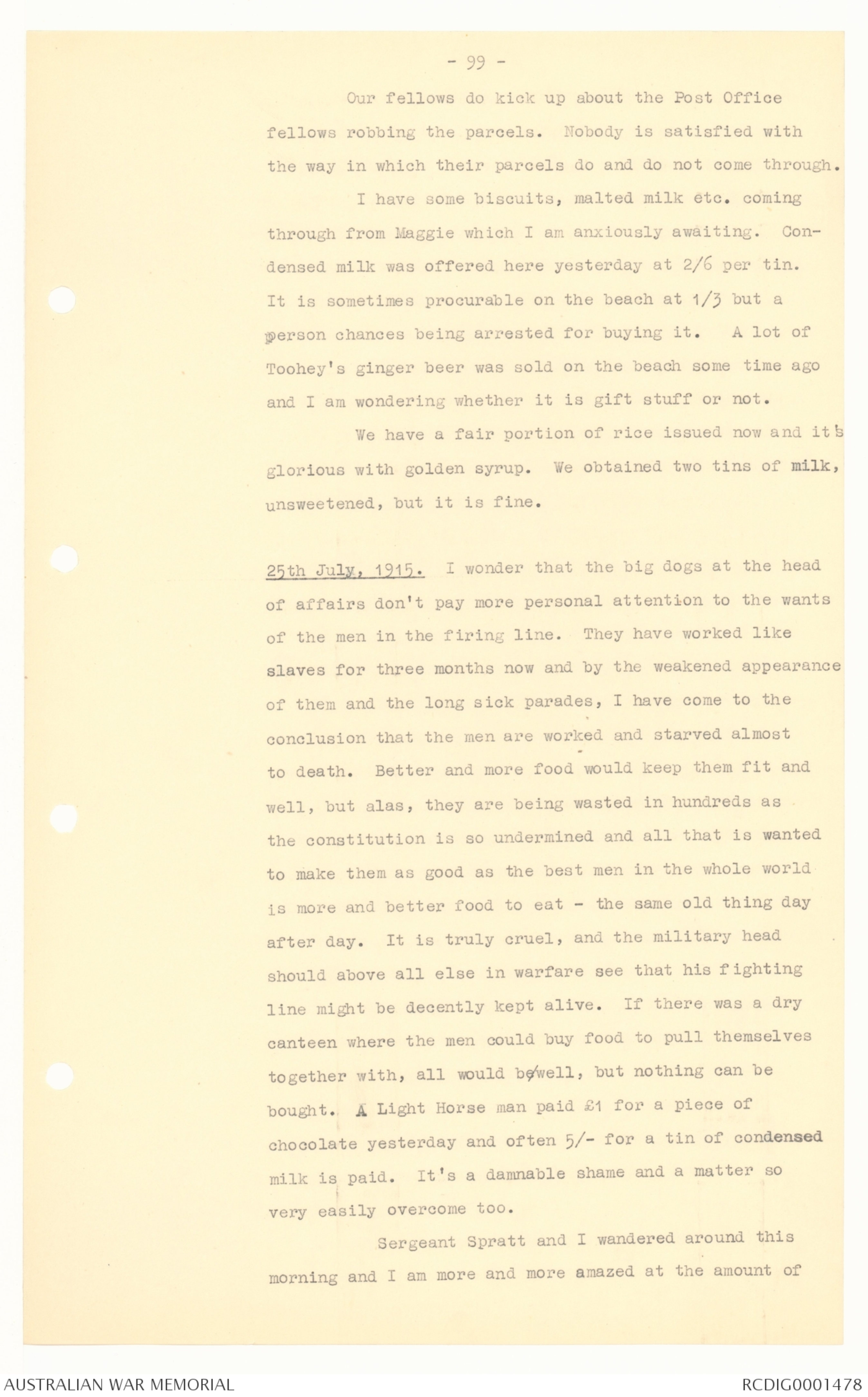
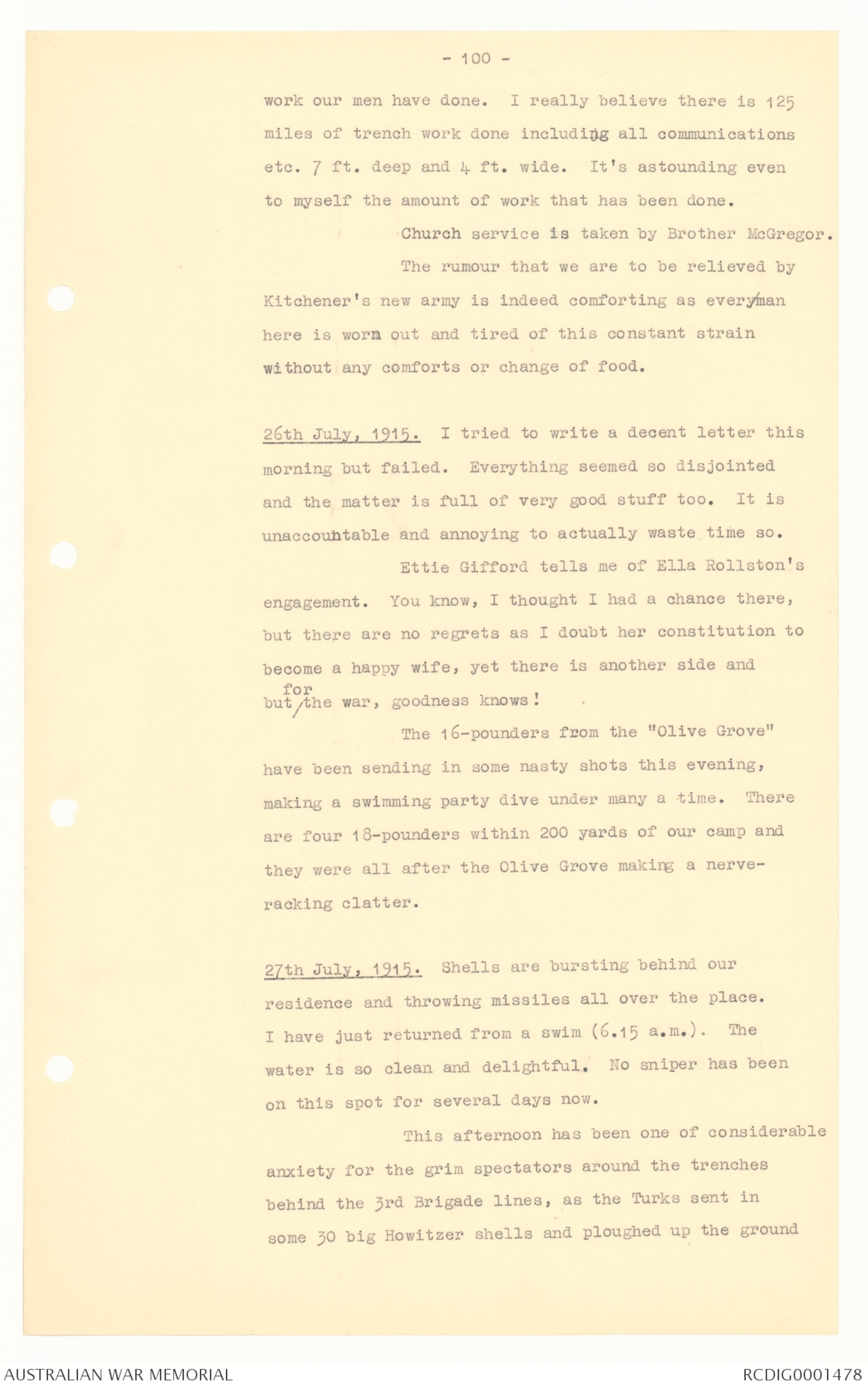
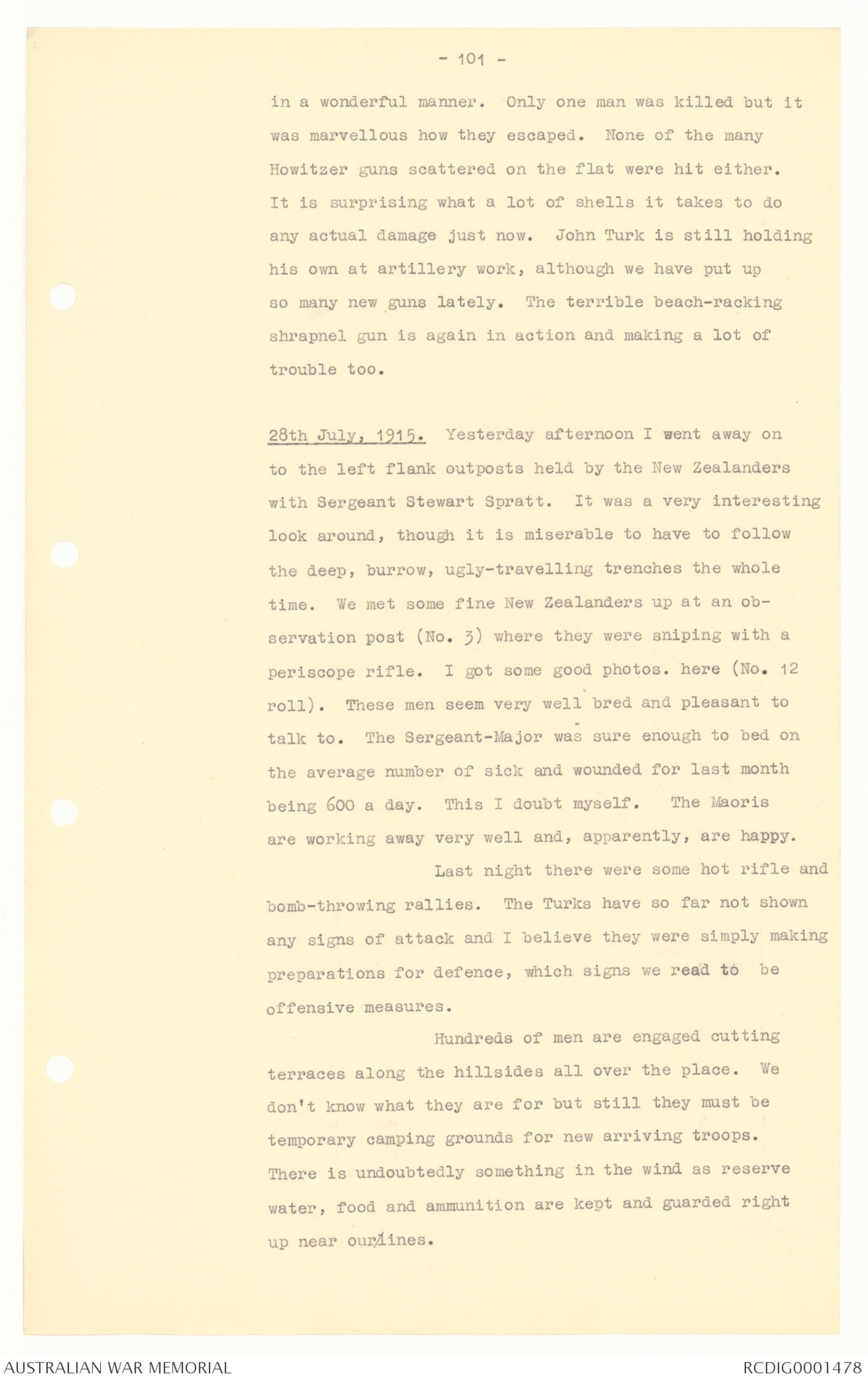
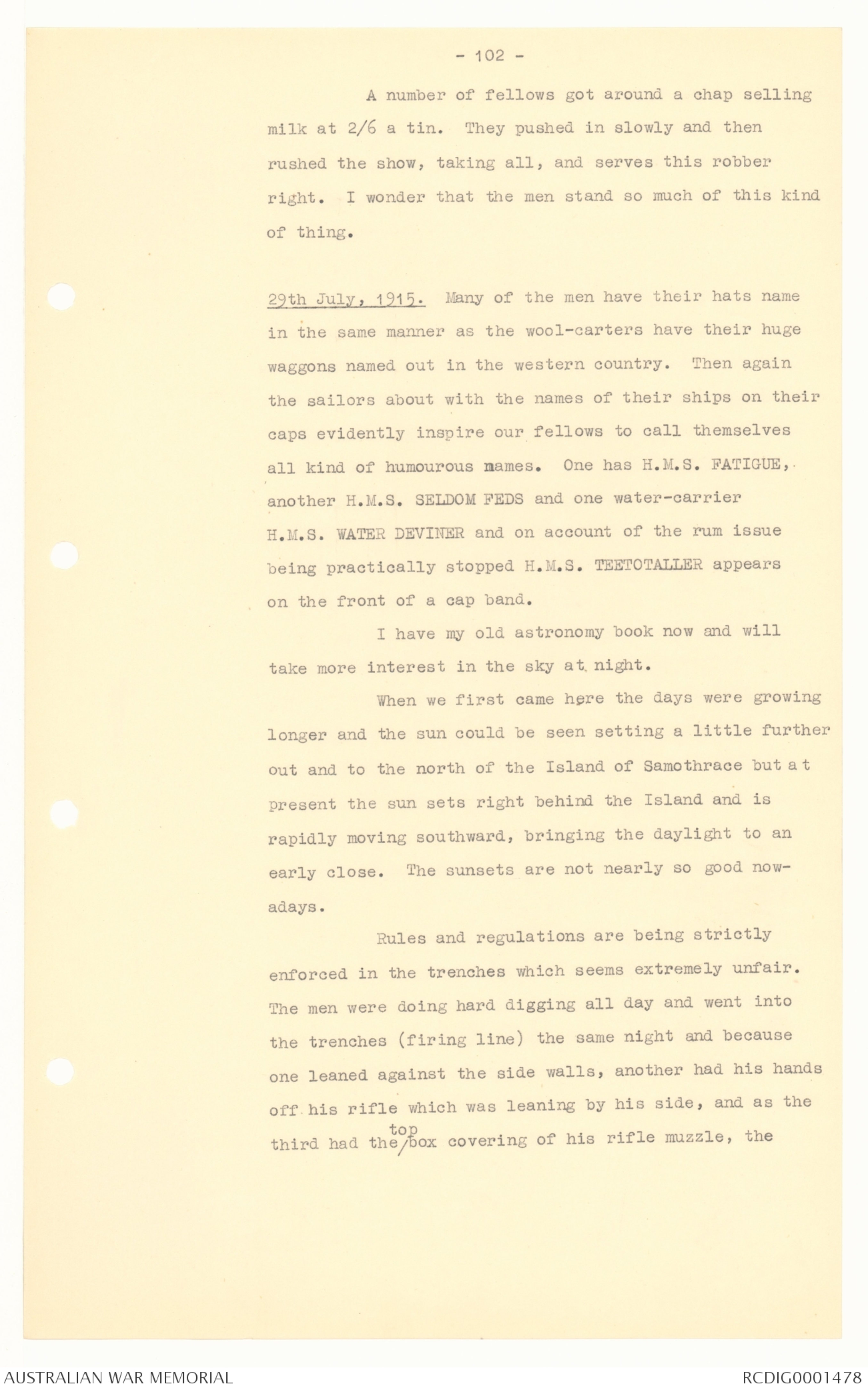
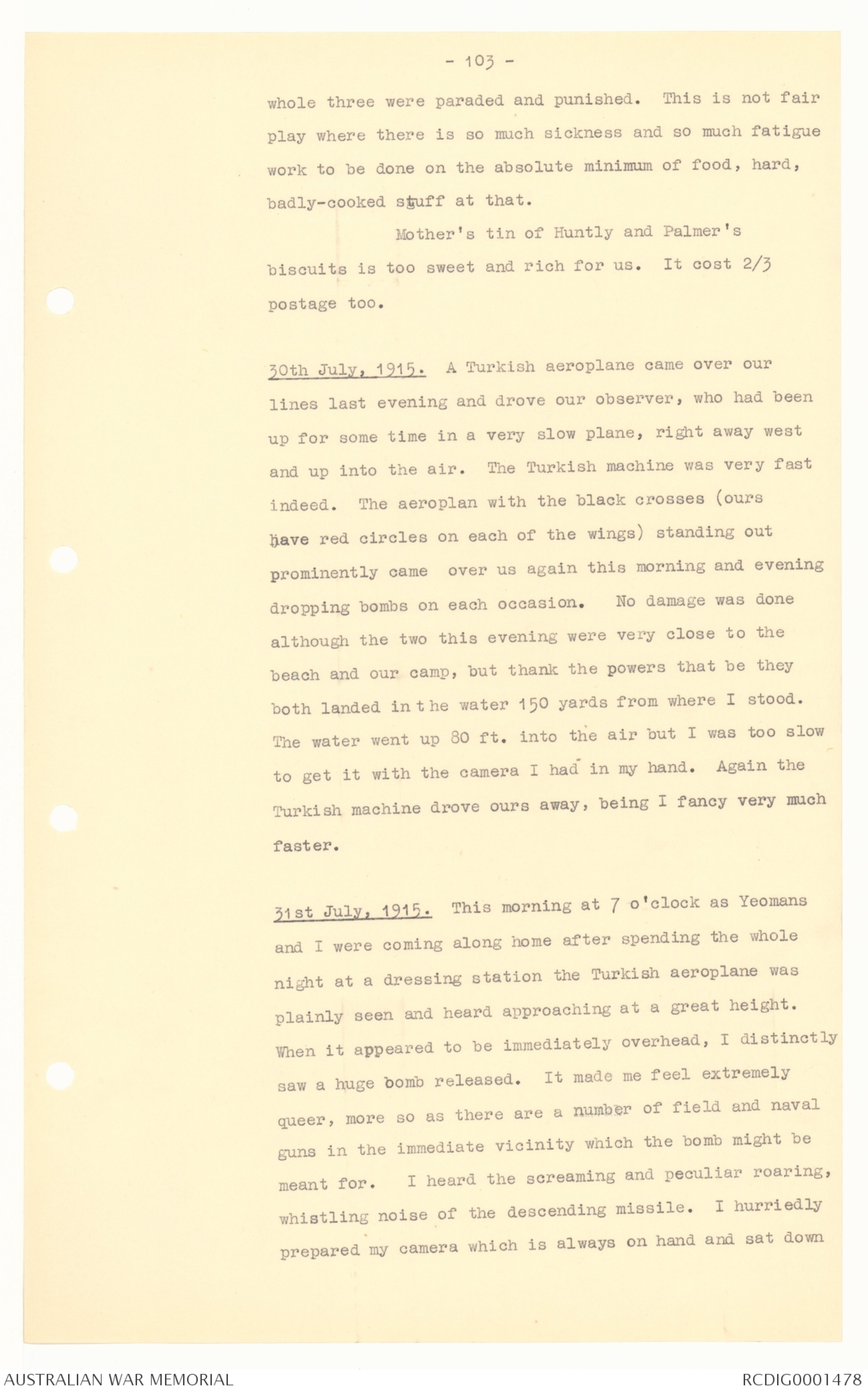
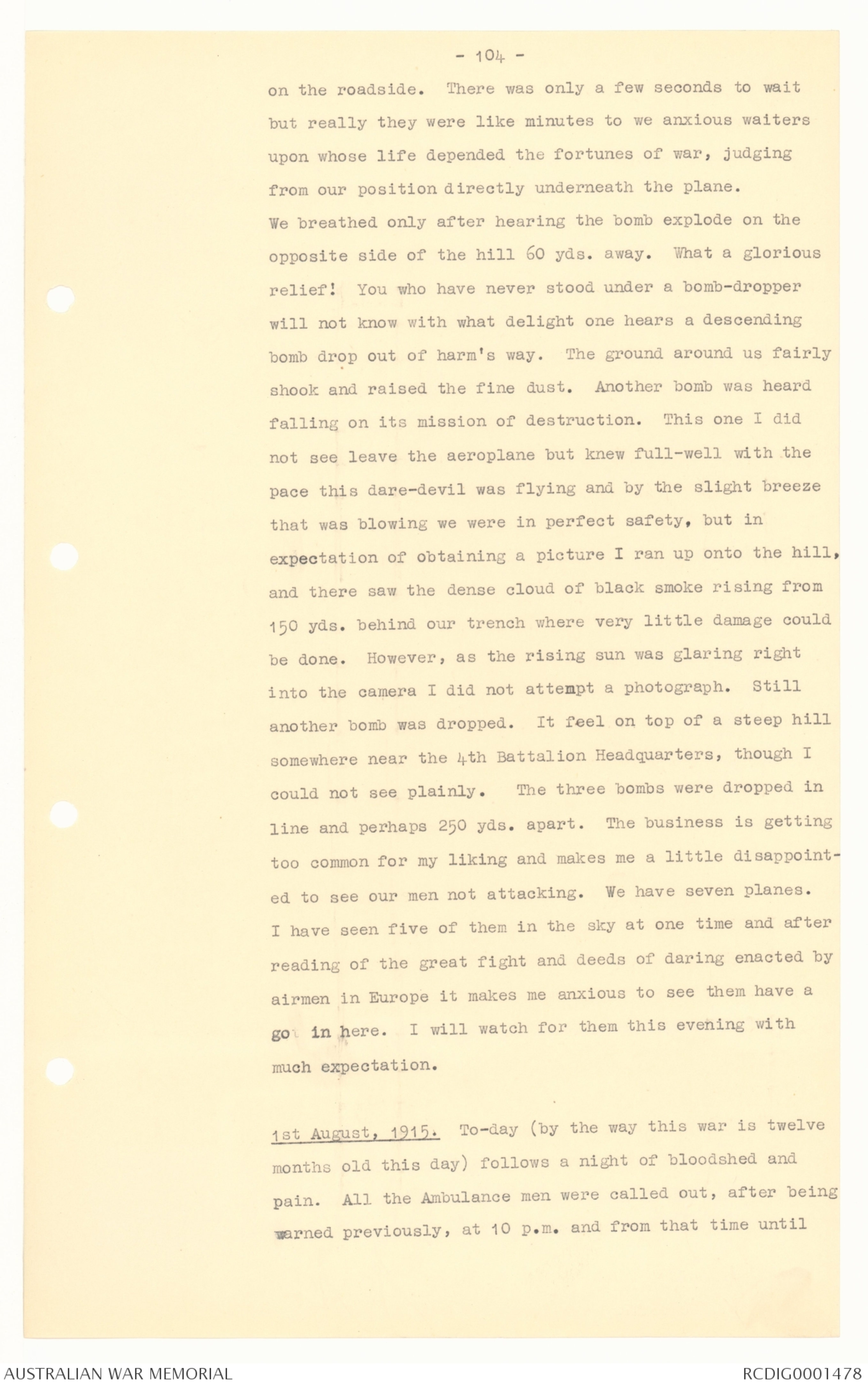
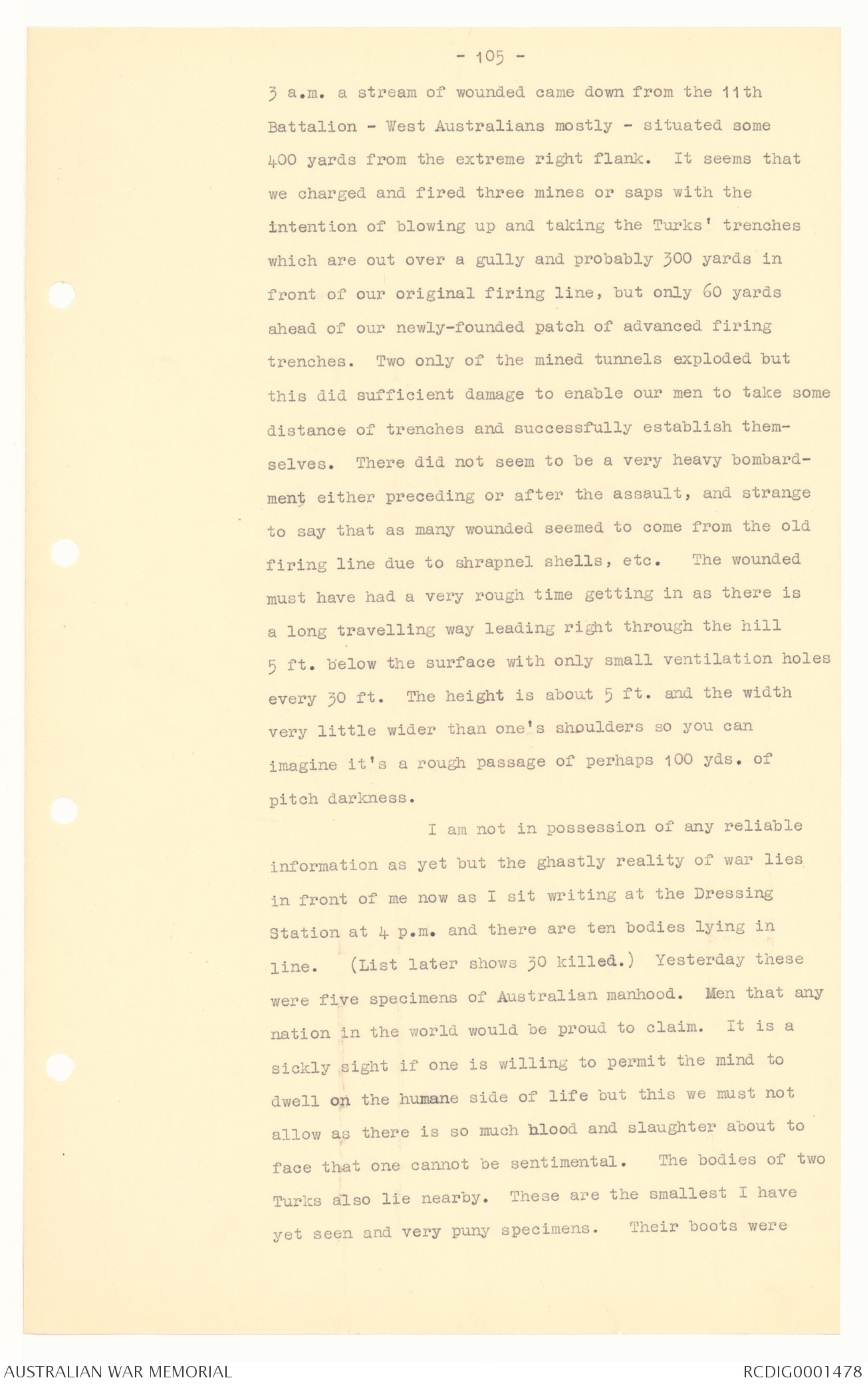
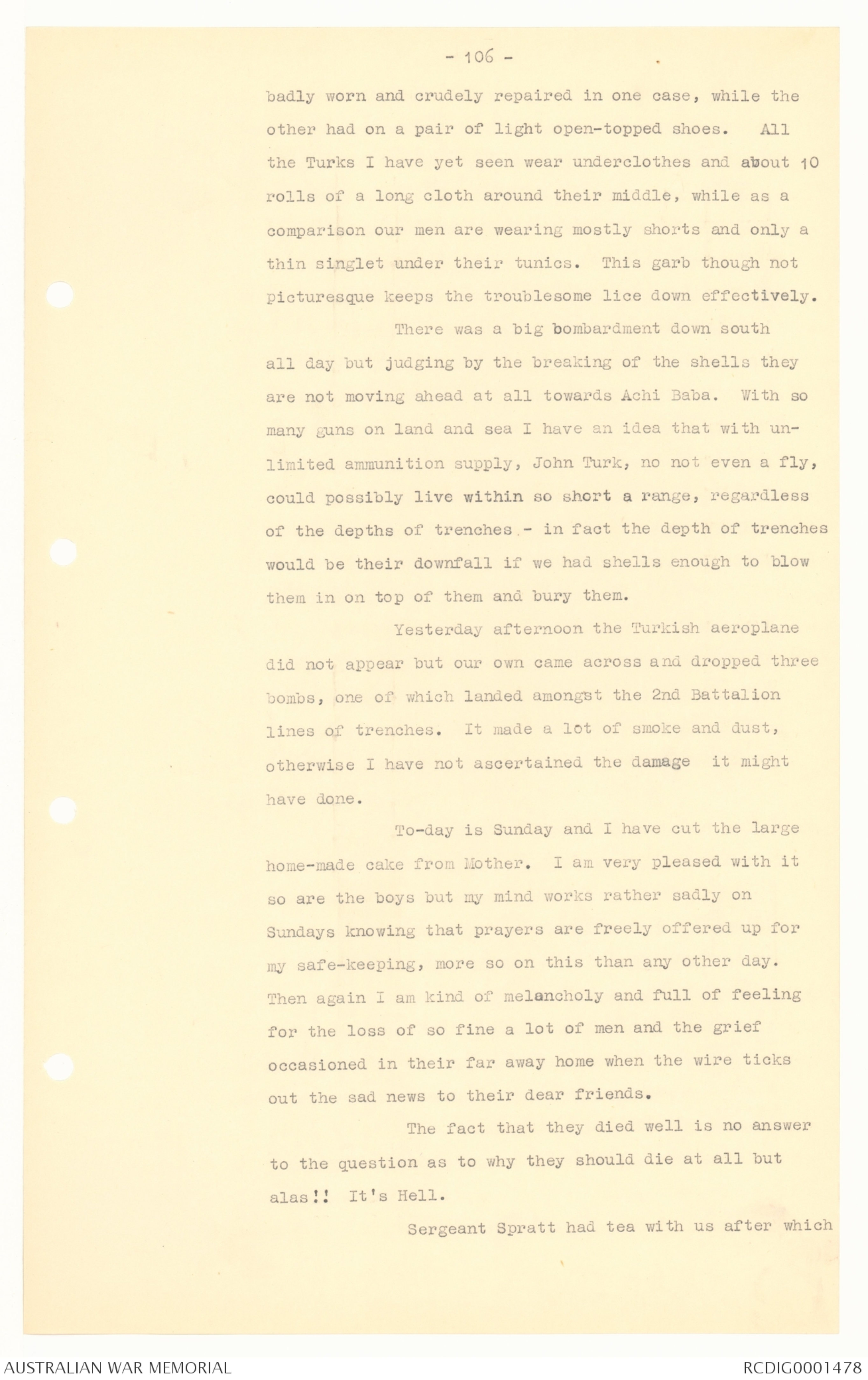
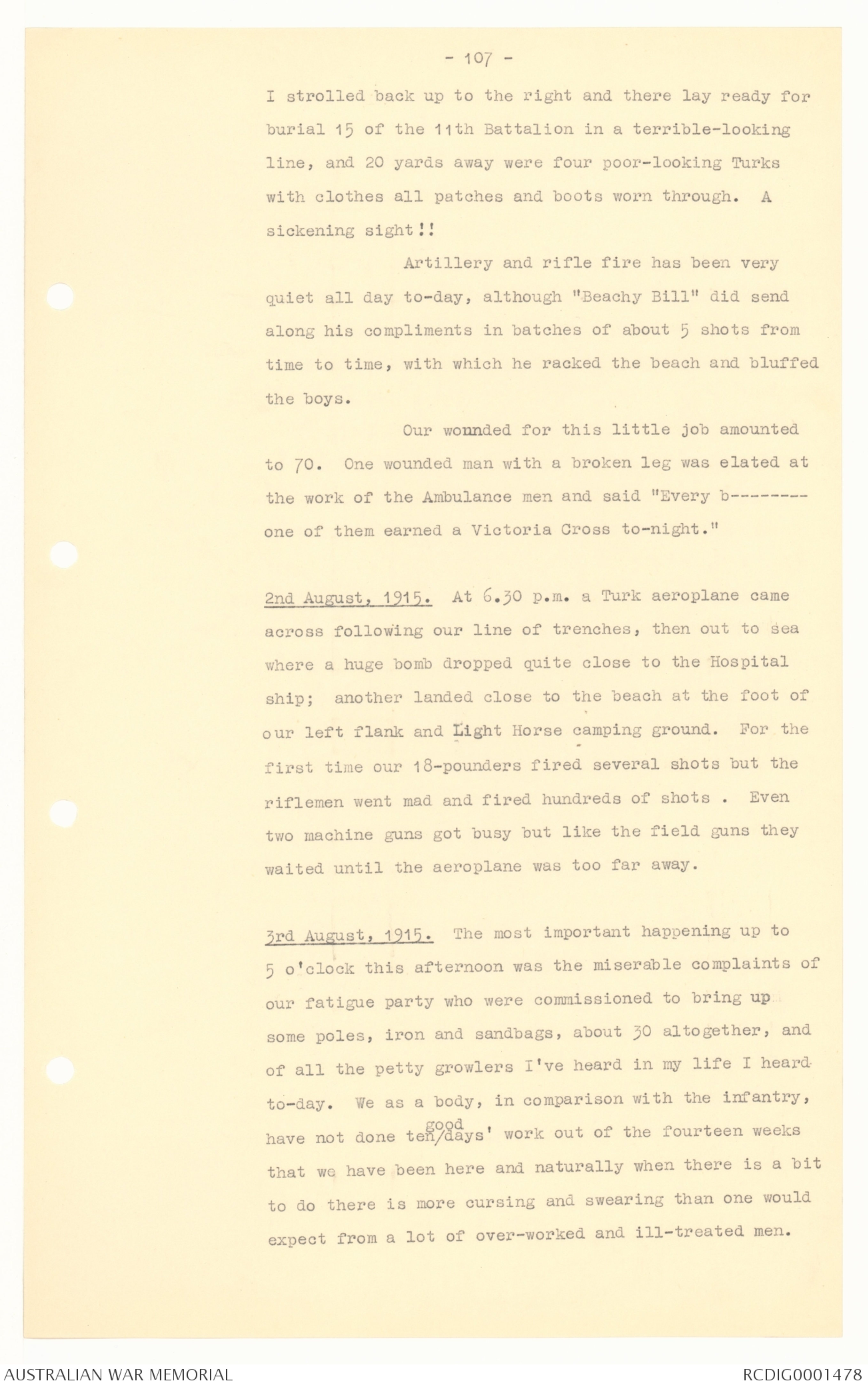
- 98 -
now particularly the old hands. They are compelled to
keep time with the new arrivals whose nerves have not
yet been tested. This firing-line and fatigue work
is very heavy on the hard fare and some five hours'
sleep a day only. I often wonder what our unionists
think of their long hours of hard work trench-digging
and sand-bagging without overtime or extras!
A bottle of curry came to us to-day and
the curried bully beef stew was grand to-night. All
the men throughout the lines have been inoculated twice
against cholera. I have been down once and felt no
effects at all. It does one good to see the indifference
our men display towards the operation, and the garb of
them would lead a stranger to suspect them of being the
poorest clothed men on earth - some no shirts, no
puttees, no boots, no hats, etc.
23rd July, 1915. Last night's attack fizzled out -
a miserable disappointment. It was one of the quietest
nights we've had for some considerable time.
Plain respirators and smoke helmets have
been issued to every man with instructions never to be
in or out of camp without them. It is said that the
Turks are preparing to use those asphyxiating gases at
any moment. It seems to me though that the strong winds
and the deep gullies will prevent any serious damage
being done here.
To-day has been an ordinary kind of a
day - a little artillery fire all the time, keeping us
always on the move and ducking.
24th July, 1915. Last night was again quiet though one
of much expectation and anxiety. Our artillery did,
however, for the first time fire a number of shots during
the night and particularly the Howitzer batteries.
- 99 -
Our fellows do kick up about the Post Office
fellows robbing the parcels. Nobody is satisfied with
the way in which their parcels do and do not come through.
I have some biscuits, malted milk etc. coming
through from Maggie which I am anxiously awaiting. Condensed
milk was offered here yesterday at 2/6 per tin.
It is sometimes procurable on the beach at 1/3 but a
person chances being arrested for buying it. A lot of
Toohey's ginger beer was sold on the beach some time ago
and I am wondering whether it is gift stuff or not.
We have a fair portion of rice issued now and it's
glorious with golden syrup. We obtained two tins of milk,
unsweetened, but it is fine.
25th July, 1915. I wonder that the big dogs at the head
of affairs don't pay more personal attention to the wants
of the men in the firing line. They have worked like
slaves for three months now and by the weakened appearance
of them and the long sick parades, I have come to the
conclusion that the men are worked and starved almost
to death. Better and more food would keep them fit and
well, but alas, they are being wasted in hundreds as
the constitution is so undermined and all that is wanted
to make them as good as the best men in the whole world
is more and better food to eat - the same old thing day
after day. It is truly cruel, and the military head
should above all else in warfare see that his fighting
line might be decently kept alive. If there was a dry
canteen where the men could buy food to pull themselves
together with, all would be/well, but nothing can be
bought. A Light Horse man paid £1 for a piece of
chocolate yesterday and often 5/- for a tin of condensed
milk is paid. It's a damnable shame and a matter so
very easily overcome too.
Sergeant Spratt and I wandered around this
morning and I am more and more amazed at the amount of
- 100 -
work our men have done. I really believe there is 125
miles of trench work done including all communications
etc. 7 ft. deep and 4 ft. wide. It's astounding even
to myself the amount of work that has been done.
Church service is taken by Brother McGregor.
The rumour that we are to be relieved by
Kitchener's new army is indeed comforting as every/man
here is worn out and tired of this constant strain
without any comforts or change of food.
26th July, 1915. I tried to write a decent letter this
morning but failed. Everything seemed so disjointed
and the matter is full of very good stuff too. It is
unaccountable and annoying to actually waste time so.
Ettie Gifford tells me of Ella Rollston's
engagement. You know, I thought I had a chance there,
but there are no regrets as I doubt her constitution to
become a happy wife, yet there is another side and
but ∧for the war, goodness knows!
The 16-pounders from the "Olive Grove"
have been sending in some nasty shots this evening,
making a swimming party dive under many a time. There
are four 18-pounders within 200 yards of our camp and
they were all after the Olive Grove making a nerve-racking
clatter.27th July, 1915. Shells are bursting behind our
residence and throwing missiles all over the place.
I have just returned from a swim (6.15 a.m.). The
water is so clean and delightful. No sniper has been
on this spot for several days now.
This afternoon has been one of considerable
anxiety for the grim spectators around the trenches
behind the 3rd Brigade lines, as the Turks sent in
some 30 big Howitzer shells and ploughed up the ground
- 101 -
in a wonderful manner. Only one man was killed but it
was marvellous how they escaped. None of the many
Howitzer guns scattered on the flat were hit either.
It is surprising what a lot of shells it takes to do
any actual damage just now. John Turk is still holding
his own at artillery work, although we have put up
so many new guns lately. The terrible beach-racking
shrapnel gun is again in action and making a lot of
trouble too.
28th July, 1915. Yesterday afternoon I went away on
to the left flank outposts held by the New Zealanders
with Sergeant Stewart Spratt. It was a very interesting
look around, though it is miserable to have to follow
the deep, burrow, ugly-travelling trenches the whole
time. We met some fine New Zealanders up at an observation
post (No. 3) where they were sniping with a
periscope rifle. I got some good photos. here (No. 12
roll). These men seem very well bred and pleasant to
talk to. The Sergeant-Major was sure enough to bed on
the average number of sick and wounded for last month
being 600 a day. This I doubt myself. The Maoris
are working away very well and, apparently, are happy.
Last night there were some hot rifle and
bomb-throwing rallies. The Turks have so far not shown
any signs of attack and I believe they were simply making
preparations for defence, which signs we read to be
offensive measures.
Hundreds of men are engaged cutting
terraces along the hillsides all over the place. We
don't know what they are for but still they must be
temporary camping grounds for new arriving troops.
There is undoubtedly something in the wind as reserve
water, food and ammunition are kept and guarded right
up near our/lines.
- 102 -
A number of fellows got around a chap selling
milk at 2/6 a tin. They pushed in slowly and then
rushed the show, taking all, and serves this robber
right. I wonder that the men stand so much of this kind
of thing.
29th July, 1915. Many of the men have their hats name
in the same manner as the wool-carters have their huge
waggons named out in the western country. Then again
the sailors about with the names of their ships on their
caps evidently inspire our fellows to call themselves
all kind of humorous names. One has H.M.S. FATIGUE,
another H.M.S. SELDOM FEDS and one water-carrier
H.M.S. WATER DEVINER and on account of the rum issue
being practically stopped H.M.S. TEETOTALLER appears
on the front of a cap band.
I have my old astronomy book now and will
take more interest in the sky at night.
When we first came here the days were growing
longer and the sun could be seen setting a little further
out and to the north of the Island of Samothrace but at
present the sun sets right behind the Island and is
rapidly moving southward, bringing the daylight to an
early close. The sunsets are not nearly so good nowadays.
Rules and regulations are being strictly
enforced in the trenches which seems extremely unfair.
The men were doing hard digging all day and went into
the trenches (firing line) the same night and because
one leaned against the side walls, another had his hands
off his rifle which was leaning by his side, and as the
third had the ∧top box covering of his rifle muzzle, the
- 103 -
whole three were paraded and punished. This is not fair
play where there is so much sickness and so much fatigue
work to be done on the absolute minimum of food, hard,
badly-cooked stuff at that.
Mother's tin of Huntly and Palmer's
biscuits is too sweet and rich for us. It cost 2/3
postage too.
30th July, 1915. A Turkish aeroplane came over our
lines last evening and drove our observer, who had been
up for some time in a very slow plane, right away west
and up into the air. The Turkish machine was very fast
indeed. The aeroplan with the black crosses (ours
have red circles on each of the wings) standing out
prominently came over us again this morning and evening
dropping bombs on each occasion. No damage was done
although the two this evening were very close to the
beach and our camp, but thank the powers that be they
both landed in the water 150 yards from where I stood.
The water went up 80 ft. into the air but I was too slow
to get it with the camera I had in my hand. Again the
Turkish machine drove ours away, being I fancy very much
faster.
31st July, 1915. This morning at 7 o'clock as Yeomans
and I were coming along home after spending the whole
night at a dressing station the Turkish aeroplane was
plainly seen and heard approaching at a great height.
When it appeared to be immediately overhead, I distinctly
saw a huge bomb released. It made me feel extremely
queer, more so as there are a number of field and naval
guns in the immediate vicinity which the bomb might be
meant for. I heard the screaming and peculiar roaring,
whistling noise of the descending missile. I hurriedly
prepared my camera which is always on hand and sat down
- 104 -
on the roadside. There was only a few seconds to wait
but really they were like minutes to we anxious waiters
upon whose life depended the fortunes of war, judging
from our position directly underneath the plane.
We breathed only after hearing the bomb explode on the
opposite side of the hill 60 yds. away. What a glorious
relief! You who have never stood under a bomb-dropper
will not know with what delight one hears a descending
bomb drop out of harm's way. The ground around us fairly
shook and raised the fine dust. Another bomb was heard
falling on its mission of destruction. This one I did
not see leave the aeroplane but knew full-well with the
pace this dare-devil was flying and by the slight breeze
that was blowing we were in perfect safety, but in
expectation of obtaining a picture I ran up onto the hill,
and there saw the dense cloud of black smoke rising from
150 yds. behind our trench where very little damage could
be done. However, as the rising sun was glaring right
into the camera I did not attempt a photograph. Still
another bomb was dropped. It feel on top of a steep hill
somewhere near the 4th Battalion Headquarters, though I
could not see plainly. The three bombs were dropped in
line and perhaps 250 yds. apart. The business is getting
too common for my liking and makes me a little disappointed
to see our men not attacking. We have seven planes.
I have seen five of them in the sky at one time and after
reading of the great fight and deeds of daring enacted by
airmen in Europe it makes me anxious to see them have a
go in here. I will watch for them this evening with
much expectation.
1st August, 1915. To-day (by the way this war is twelve
months old this day) follows a night of bloodshed and
pain. All the Ambulance men were called out, after being
warned previously, at 10 p.m. and from that time until
- 105 -
3 a.m. a stream of wounded came down from the 11th
Battalion - West Australians mostly - situated some
400 yards from the extreme right flank. It seems that
we charged and fired three mines or saps with the
intention of blowing up and taking the Turks' trenches
which are out over a gully and probably 300 yards in
front of our original firing line, but only 60 yards
ahead of our newly-founded patch of advanced firing
trenches. Two only of the mined tunnels exploded but
this did sufficient damage to enable our men to take some
distance of trenches and successfully establish themselves.
There did not seem to be a very heavy bombardment
either preceding or after the assault, and strange
to say that as many wounded seemed to come from the old
firing line due to shrapnel shells, etc. The wounded
must have had a very rough time getting in as there is
a long travelling way leading right through the hill
5 ft. below the surface with only small ventilation holes
every 30 ft. The height is about 5 ft. and the width
very little wider than one's shoulders so you can
imagine it's a rough passage of perhaps 100 yds. of
pitch darkness.
I am not in possession of any reliable
information as yet but the ghastly reality of war lies
in front of me now as I sit writing at the Dressing
Station at 4 p.m. and there are ten bodies lying in
line. (List later shows 30 killed.) Yesterday these
were five specimens of Australian manhood. Men that any
nation in the world would be proud to claim. It is a
sickly sight if one is willing to permit the mind to
dwell on the humane side of life but this we must not
allow as there is so much blood and slaughter about to
face that one cannot be sentimental. The bodies of two
Turks also lie nearby. These are the smallest I have
yet seen and very puny specimens. Their boots were
- 106 -
badly worn and crudely repaired in one case, while the
other had on a pair of light open-topped shoes. All
the Turks I have yet seen wear underclothes and about 10
rolls of a long cloth around their middle, while as a
comparison our men are wearing mostly shorts and only a
thin singlet under their tunics. This garb though not
picturesque keeps the troublesome lice down effectively.
There was a big bombardment down south
all day but judging by the breaking of the shells they
are not moving ahead at all towards Achi Baba. With so
many guns on land and sea I have an idea that with unlimited
ammunition supply, John Turk, no not even a fly,
could possibly live within so short a range, regardless
of the depths of trenches- in fact the depth of trenches
would be their downfall if we had shells enough to blow
them in on top of them and bury them.
Yesterday afternoon the Turkish aeroplane
did not appear but our own came across and dropped three
bombs, one of which landed amongst the 2nd Battalion
lines of trenches. It made a lot of smoke and dust,
otherwise I have not ascertained the damage, it might
have done.
To-day is Sunday and I have cut the large
home-made cake from Mother. I am very pleased with it
so are the boys but my mind works rather sadly on
Sundays knowing that prayers are freely offered up for
my safe-keeping, more so on this than any other day.
Then again I am kind of melancholy and full of feeling
for the loss of so fine a lot of men and the grief
occasioned in their far away home when the wire ticks
out the sad news to their dear friends.
The fact that they died well is no answer
to the question as to why they should die at all but
alas!! It's Hell.
Sergeant Spratt had tea with us after which
- 107 -
I strolled back up to the right and there lay ready for
burial 15 of the 11th Battalion in a terrible-looking
line, and 20 yards away were four poor-looking Turks
with clothes all patches and boots worn through. A
sickening sight!!
Artillery and rifle fire has been very
quiet all day to-day, although "Beachy Bill" did send
along his compliments in batches of about 5 shots from
time to time, with which he racked the beach and bluffed
the boys.
Our wounded for this little job amounted
to 70. One wounded man with a broken leg was elated at
the work of the Ambulance men and said "Every b------
one of them earned a Victoria Cross to-night."
2nd August, 1915. At 6.30 p.m. a Turk aeroplane came
across following our line of trenches, then out to sea
where a huge bomb dropped quite close to the Hospital
ship; another landed close to the beach at the foot of
our left flank and Light Horse camping ground. For the
first time our 18-pounders fired several shots but the
riflemen went mad and fired hundreds of shots. Even
two machine guns got busy but like the field guns they
waited until the aeroplane was too far away.
3rd August, 1915. The most important happening up to
5 o'clock this afternoon was the miserable complaints of
our fatigue party who were commissioned to bring up
some poles, iron and sandbags, about 30 altogether, and
of all the petty growlers I've heard in my life I heard
to-day. We as a body, in comparison with the infantry,
have not done ten ∧good days' work out of the fourteen weeks
that we have been here and naturally when there is a bit
to do there is more cursing and swearing than one would
expect from a lot of over-worked and ill-treated men.
 Loretta Corbett
Loretta CorbettThis transcription item is now locked to you for editing. To release the lock either Save your changes or Cancel.
This lock will be automatically released after 60 minutes of inactivity.